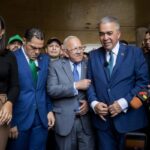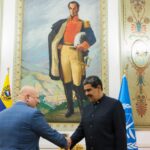
Let us agree that in our country it is very difficult to remember. And so many things happen in such a short time, that a couple of weeks, two months, a year or five, amount to several decades or even a century of events in other countries. But it should not stop being difficult, especially when it is so urgently necessary.
So, let’s go to 2015 for a moment, not in the mood to review the past, but to see in perspective things that can happen once again in 2019 if we do not act intelligently as citizens.
- In December of that year, to the extent that the government looked as entangled as it is right now in economic matters, the opposition surprises us: it got a large majority of deputies in the National Assembly. Still, in spite of this, they continue saying that there are no electoral conditions and that they cheat them, but hey: that is precisely part of the problem. The truth is that, emboldened, they were unable to comply with the balance of powers, assuming in fact to be above the Executive, the Electoral, the Judicial and the Constitution itself. In that spirit, they took the Assembly in early 2016, promising to leave the government in less than six months, for which they activated various strategies … except one, which, paradoxically, was the one that was most plausible to its ends: the recall referendum.
- Because although today there are those who insist that the presidential recall was not done because the government prevented it, the truth is that the opposition discarded it, as it was stated at the time by the then president of the National Assembly, the deputy Henry Ramos Allup. This, among other spokesmen, came to affirm verbatim on several public occasions that the referendum option was “very cumbersome”. For which purpose they privileged “simpler, more efficient, safer and less burdensome” mechanisms (such as, for example, the amendment and the declaration of abandonment of office), none of which could be activated, since constitutionally they did not lend themselves to said purposes. The issue is that when they realized it was too late. Only that faithful to their tradition of not assuming responsibilities they summoned it, knowing that the times did not give them, but counting on the mediatic pandering when it was time to say that the government was the culprit, what was added to the matrix of totalitarianism.
- After this oppositionist entanglement passed 2016, Maduro remained in the presidency and the National Assembly fell into content. In January of 2017, Julio Borges assumed his leadership. This act had no legal effect given the contempt, but following the custom of placing himself above the laws, Borges led a incendiary discourse of ignorance of institutions and called the war of all against all. Two months after that call, more than 170 Venezuelans died in days of fierce street violence. Only 10% of these deaths were caused by police or military bodies: the remaining 90% by paramilitarized groups and the hordes formed around them. Several were burned alive, lynched and tortured. Others killed for “looking like Chavista”, “thief”, “of a colectivo”, or for not stopping at some of the fascist barricades, all of which, for the rest, fall into the international category of hate crimes. Several other victims were oppositionists murdered by their “comrades in arms” or killed for lack of skill when handling homemade weapons supplied by the instigators. Even a lady who had nothing to do with either side, died for a bottle thrown by a lawyer linked to right-wing parties who followed the recommendation given the night before by a right-wing “intellectual” now comfortably in “exile” . They attacked schools, maternities, hospitals, media and transport, family homes, universities, police stations and even military and police barracks. Each and every one of those deaths and attacks on public and private persons and properties were duly bleached and justified by the great press “and infuencers. And even, as we now know, they had the open and blatant complicity of the Public Ministry and its then-incumbent.
- Four months lasted the attacks, resulting in a resounding failure for the opposition leadership: they did not overthrow the government, they did not provoke a military invasion, they could not avoid the constituent and then they were swept away in the elections for governors and mayors. However, what they did succeed in deepening the country’s ills: the economic situation worsened since then and social unrest deepened.
- A year after that criminal call, Mr. Borges and his followers go to a dialogue table with the government and with the international mediation required and chosen by them. However, after several weeks with the country in suspense waiting for the agreements, the opposition got up at the last minute (when only the signature was missing) arguing that they would not subscribe something that did not satisfy them. The striking thing is that the document to be signed was a list of complacencies to all their demands: they wanted early presidential elections and the government gave it to them; they wanted international observers and not chosen by the CNE and they were guaranteed; they asked that the register of new voters be opened by the CNE and the relocation of those who vote abroad, and this was also accepted; as well as having at least two members of their trust in the board of the electoral entity and the completion of all possible public audits, prior to and after the electoral event. Even participation of opposition candidates in state media was guaranteed. And still they did not sign. It must be the only case in history when a negotiating group gets everything it asks for, but does not sign because it does not agree.
- The excuses of the influencers and opposition spokesmen not to sign, was the non-acceptance of the government of the so-called “humanitarian corridor” and the one that has not validated the MUD and Primero Justicia Card (that means let it be in the ballot card without having enough signatures), and removed the disqualification from Capriles and López. Both “arguments” were absurd. As for the first, because no political group would leave aside the possibility of coming to power in the midst of an electoral event, with all the guarantees agreed upon under international observation, except when it claims to be overwhelming. In fact, it would do the exact opposite of what the MUD did (as did the anti-Sandinista coalition in Nicaragua that brought Violeta de Chamorro to power) because it would be the perfect opportunity to carry it out with his permission. And the second, because beyond implying ignorance of procedures and sentences of public bodies, reflects the political myopia and misgivings among a leadership that superimposes their partisan interests to the cause they claim to defend. It goes without saying that when the presidential elections finally took place, the MUD refrained from participating and split, which ended up facilitating the re-election of President Nicolás Maduro and ergo … here we are.
- And when we say “here we are” we mean that we are in the preliminaries of a new incendiary adventure, which may be even more costly and regrettable than the one in 2017. The 170 fatalities of 2017 quadrupled to those of 2014 when the guarimbas summoned by Leopoldo López, which in turn quadrupled to 2013 when the infamous call to “go out to unload the arrechera” Capriles Radonski: how much can overcome another 2017 new madness as is being called ?
- Because one thing is that there are reasons and many to protest, among which must be included the inability of the government to address fundamental problems. But another is the usufruct of that real and legitimate discomfort on the part of irresponsible and indolent people who play with the life and death of all.
- As an example. On the night of January 21, 2018, on the eve of the new “D-Day” for the government’s exit – about the tenth in five years – barricades were erected in some areas of Caracas. But it was not simply protests. They immediately became attacks on property and people, as, for example, happened in the Pinto Salinas sector north of Caracas where hooded men attacked with stones and incendiary bombs a residential complex of typical middle class neighbors. Some oppositionist influencers, with the cynicism and irresponsibility that characterizes them, only managed to say that “the peaceful protest took another course”. What should remind us of what these adventures usually end, not only for Chavistas and people outside the political diatribe, but also and above all, for many who dare to join them: they end up being their own victims, self-abducted, self-assaulted, self-looted, self-ruined and then forgotten by a leadership that is soon going to live abroad, if not that it summons all these excesses and comfortably installed there.
- Last but not least, since it has to do with the above, always and everywhere history shows that this type of violence, when it is triggered, ends up dragging everyone, regardless of who initiated it or its objective . And here we have to take into account what is happening at the moment in countries like Ecuador, Peru and Colombia with the persecution against Venezuelans, regardless of their political, social, sexual, age, etc. status. And it is that so much has been campaigned against the country, so much has been denigrated against ourselves, that today, when many compatriots have been forced by the situation, whether or not Chavistas, are subject to segregation in the least bad of cases and hunting and death in the worst. Here we must remember again Julio Borges, who went on to say that Venezuelans were “a contagious disease”, declarations much more serious than those of the Ecuadorian president because they come from a national authority. How many Venezuelans oppositionists, who today are outside of the country looking for other directions, are not paying the consequences of this?
Translated by JRE/AR
- orinocotribunehttps://orinocotribune.com/author/orinocotribune/
- orinocotribunehttps://orinocotribune.com/author/orinocotribune/April 23, 2024
- orinocotribunehttps://orinocotribune.com/author/orinocotribune/
- orinocotribunehttps://orinocotribune.com/author/orinocotribune/
Share this:
- Click to share on Twitter (Opens in new window)
- Click to share on Facebook (Opens in new window)
- Click to share on LinkedIn (Opens in new window)
- Click to share on WhatsApp (Opens in new window)
- Click to share on Reddit (Opens in new window)
- Click to share on Telegram (Opens in new window)
- Click to email a link to a friend (Opens in new window)





